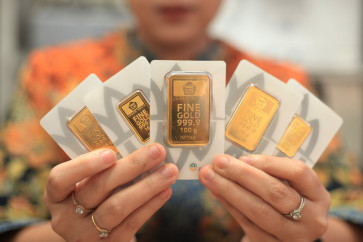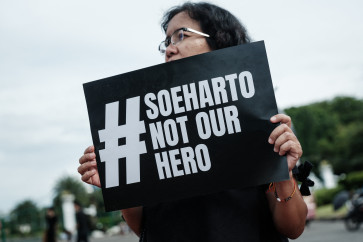Popular Reads
Top Results
Can't find what you're looking for?
View all search resultsPopular Reads
Top Results
Can't find what you're looking for?
View all search resultsImported plastic saves tofu makers – but poisons their villages
Toxic smoke: Scavenger Puji Urip, 60, stands in front of burning plastic waste at a dumpsite full of imported plastic in Mojokerto, East Java, on Dec
Change text size
Gift Premium Articles
to Anyone
Toxic smoke: Scavenger Puji Urip, 60, stands in front of burning plastic waste at a dumpsite full of imported plastic in Mojokerto, East Java, on Dec. 4, 2018.(Courtesy of Fulli S. Handoko)
Tofu is one of the few cheap sources of protein in most parts of Indonesia. To maintain its price, most tofu factories use cheap imported soybeans and now some of them are using imported plastic waste as fuel.
At least 50 tofu factories in Tropodo village in Sidoarjo, East Java, have used a mix of imported paper and plastic waste to fuel their stoves amid the soaring price of firewood.
While the strategy helps tofu makers to maintain their profit, it comes with a huge price for the people and environment around them.
A recent report entitled “Plastic Waste Poisons Indonesia’s Food Chain” shows that plastic waste, much of which was imported from the West, has contaminated eggs produced by free-range chickens in Tropodo village, as well as Bangun village in Mojokerto regency.
Imported plastic and other hazardous waste have inundated the two East Java villages since last year when China closed its doors to the importation of 24 types of waste material. Every day, the areas receive more than 50 tons of low-grade plastic.
Just like tofu makers in Tropodo, Bangun villagers also burn the plastic — not to fuel their stoves — but simply to get rid of piling waste from around their houses.
The report found that the thick smoke coming from burnt plastic released toxic chemicals that contaminated food materials and posed a serious health risk to humans.
The report was jointly launched by several environmental groups, including the International Pollutants Elimination Network (IPEN), the Indonesia-based Nexus3 and the Czech Republic-based Arnika Association.
“Eggs collected in the communities were found to contain highly hazardous banned chemicals including dioxins, flame retardants, and the toxic [...] perfluorooctane sulfonate or PFOS,” the report says, adding that the United Nations aims to eliminate or restrict the production and use of such organic pollutants under the Stockholm Convention.
Scientists often use free-range eggs as an indicator to measure pollution in an area.
Free-range egg samples collected near a tofu factory in Tropodo contain the second-highest level of dioxins in eggs from Asia.
“An adult eating just one egg from a free-range chicken foraging in the vicinity of the tofu factory in Tropodo would exceed the European Food Safety Authority (EFSA) tolerable daily intake for chlorinated dioxins 70-fold,” the report says.
The sampled Tropodo eggs are only less hazardous than dioxin-contaminated eggs collected in an area in Vietnam contaminated by the Agent Orange chemical weapon.
Dioxins are known for their link to serious illnesses ranging from endometriosis to cancer.
IPEN adviser Lee Bell said the report was a call for authorities to ban plastic waste combustion, address environmental contamination and control hazardous and plastic waste imports.
“It’s clear from the study that plastic pollution imperils human and environmental health not only from the visible deluge of plastic trash, but from the invisible chemical contaminants in plastics and those created when burning plastics,” Bell said in a statement on Thursday.
Yuyun Ismawati of Nexus3 asserted that the relevant governmental authorities should stop the export of plastic waste from their respective jurisdictions once and for all.
“The Global North [countries of the northern hemisphere] needs to stop treating the Global South as its waste bin.”
Agus Haryono, a researcher at the Indonesian Institute of Sciences’ (LIPI) chemical research center, suggested that the hazardous chemicals might contaminate the eggs in two ways: adsorbed directly by the hens, or adsorbed by the plants which are eventually eaten by the chickens.
He added that the toxic chemicals could cause severe diseases such as cancer and other diseases in reproductive systems, while it could also cause skin problems for people exposed to a high concentration of such chemical substances in the short term.
“There should be monitoring of people working in the tofu factory, as they breathe the smoke produced from the burnt plastic waste almost every day,” Agus said.
Responding to the report, the Environment and Forestry Ministry’s director general of waste and hazardous and toxic material management, Rosa Vivien Ratnawati, said on Thursday that before making any official statement, her office “will study the report first”.
Environmental watchdogs found earlier this year that a number of villages in East Java had been plagued by imported waste, with local scavengers often finding plastic packaging from developed countries such as the United States, the United Kingdom and Australia.
They also recently claimed that Indonesian authorities had been sending waste containers to other countries such as India, Thailand and Vietnam rather than returning them to their countries of origin — most of which came from the US.
Activists alleged that the governments of Indonesia and countries of origin had defied the international norm as stipulated in the Basel Convention that requires the exporting country to take responsibility for the imported waste by “reimporting” it.
The convention, of which Indonesia is a party, is an international treaty that controls the movement of hazardous waste between countries.
The Indonesian government had denied the allegation, saying paper recycling companies importing the contaminated waste had filled out their “reexport” documents accordingly and ordered the waste containers to be sent to the US and Germany.
Indonesian companies have been importing scrap materials to be used by recycling companies, most of which are recycling papers.
However, in some cases, the scrap materials were contaminated with hazardous waste, such as diapers and plastics, which could not be processed and eventually ended up as garbage in landfills.










